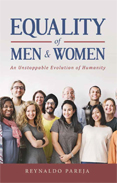
 |
Equality of Women and Men: An Unstoppable Evolution of Humanity
by Reynaldo Pareja
URLink, Print and Media
The vast topic of women’s equality is distilled admirably in this volume, which also serves as a promotion for the Baha’i Faith based on its embrace of the spiritual equality of men and women and the author’s engagement with the philosophy. Pareja makes it clear that “this book is not intended to be a scholarly or academic work because it is written for a general audience.”
The author covers extensive anthropological, historical, and sociological ground, examining the economic and political structures that have worked in tandem to subjugate a majority of women during recorded human history. The book provides a solid overview of the patriarchal paradigm in major world cultures and religions: Egypt, Greece, India, Japan, medieval Europe, Persia, and the Roman Empire. Also examined is the treatment of women in faith-based philosophies: Buddhism, Baha’I Faith, Christianity, Islam, Judaism, and Hinduism. Pareja also takes a fascinating look at creation myths concerning women in various cultures. There is lively discussion of the various historical events that have helped to change women’s unequal status, such as the overthrow, abolition, or democratization of the monarchy, the abolition of slavery, and the separation of church and state in mature and emerging democracies.
With a heart true to his spiritual faith, Pareja envisions the evolution of gender equality in a positive frame of reference despite the many obstacles that women have faced throughout recorded history and still continue to face today. The discourse embraces the spiritual ideal of women as the benevolent arbitrators of a more balanced and wholesome future. Though many gender equity battles remain to be fought, this positive outlook may inspire many readers to collaborate in a more just and equitable world for all.